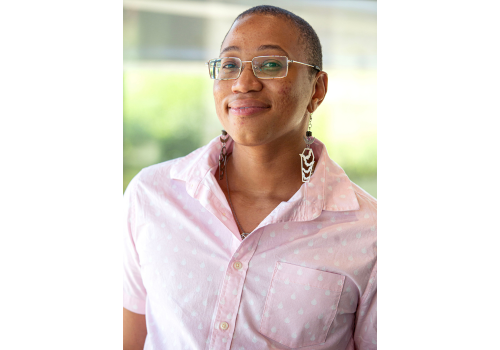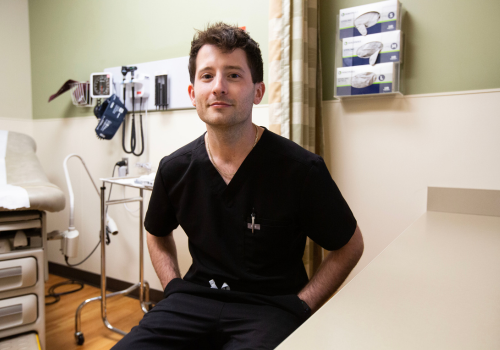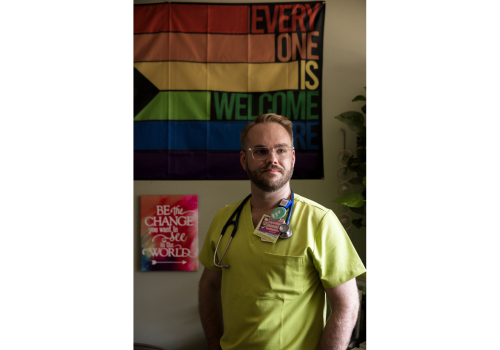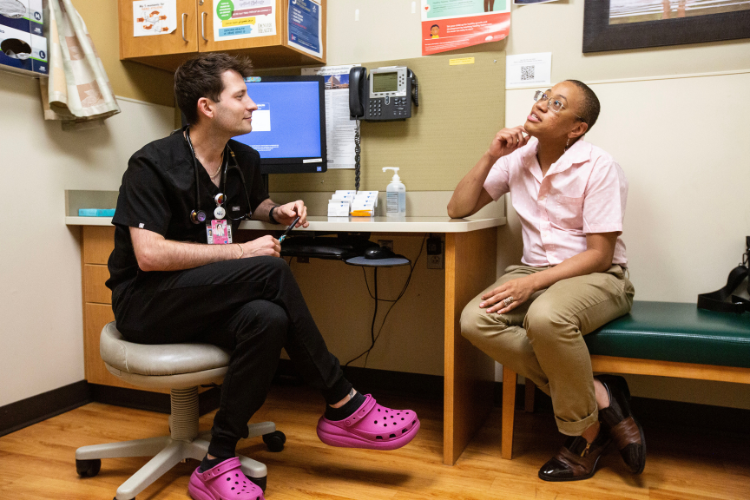Story by Stephanie Daniel and photos by Jennifer Coombes and Rebecca Stumpf, KUNC.
Recent experiences of Trans residents in Colorado demonstrate the positive mental health impacts of gender-affirming care
When Elliot Harris was a kid, the way he was socialized didn’t feel quite right. “My self, my actual self, like, just did not form a super strong relationship with girlhood or womanhood, or any gender, really,” Harris said.
Harris has struggled with mental health for most of his life. He remembers having his first suicidal thought – and the depression that came with it – around age nine or ten.
“Coincidentally, that is also when I started developing my body,” he said. “The timing was very interesting.”
The 29 year-old has been in therapy for over a decade and made great strides by taking medications and learning coping skills. Yet, even after doing the work, he would find himself back in a state of depression. Harris didn’t know it at the time, but he was dealing with gender dysphoria, referring to the distress some people feel when their bodies – or society’s perceptions of them – don’t align with their gender.
In 2022, Harris began his medical transition which included taking testosterone. The side effects were less than desirable. Itching, bumpy skin, congestion, like a teenage boy going through puberty. Despite all this, he felt better: physically, mentally and emotionally. It was like a fog had lifted.
“The depression and the suicidality went away, as I transitioned and as the testosterone really just kind of settled into my body,” he said. “I feel just generally happier, easier able to cope with the stresses of life.”
Hormone therapy isn’t the right choice for everyone with gender dysphoria but it worked for Harris, along with regular therapy and support from family and friends. He’s now an openly Transgender man and in a much better place, but he's still evolving.
Receiving adequate training
Harris, dressed casually in gray sweatpants and a t-shirt, sat in an exam room at a Denver Health clinic in May. He was there for a checkup with Dr. Corey Walsh, his primary care physician. This was Harris’ last appointment before having top surgery in 10 days.
His brown eyes lit up behind his glasses as he chatted with Walsh. “That is very exciting,” Harris said. “I'm, like, prepared for that. My partner is available, and is helping me.”
“I think you're gonna do great,” Walsh replied.
Walsh is one of over 100 providers who have received training to serve LGBTQIA2S+ patients at Denver Health clinics throughout Denver County. Other staff, like security, the front desk and nurses, also have been trained on interactions with these patients in a way that affirms who they are.
Walsh is Queer and originally became a doctor to provide care for Trans patients. “I have a number of ... very close people in my life who identify as Trans and (have) seen all of the struggles that they go through,” Walsh said.

Transgender adults are more likely to experience adverse mental and physical health outcomes than cisgender adults, according to analysis by the Center for American Progress. Challenges include higher rates of tobacco and substance use, physical attacks and sexual assaults.
“(As) a Black Trans woman, you are facing many more issues than somebody who has a different identity in terms of health care outcomes, in terms of housing, in terms of employment,” said Dr. Elizabeth Petty, senior associate dean for academic affairs at the University of Wisconsin School of Medicine and Public Health. “In terms of so many different factors that impact our health.”
Another big health concern for LGBTQIA2S+ people is the risk of suicide. A 2016 study found 17 percent of Queer adults had attempted suicide during their lifetime compared to less than three percent of the general U.S. population. Last year, a national survey by The Trevor Project found 41 percent of LGBTQIA2S+ youth had seriously considered suicide in the past year.
Colorado has emerged as a leader in gender-affirming healthcare for Trans and Nonbinary people. Treatments can include puberty blockers, hormones or surgery. Medical experts note that similar care is also given to cisgender people, but for Trans people it can be life-saving.
Walsh attended the University of Colorado School of Medicine and said when he started in 2017 it had a robust gender diversity program. That was thanks to the work of several faculty members, including Dr. Rita Lee.
'Just part of the doctor’s job'
Lee has been a general internist for over two decades and came out as a Lesbian during medical school. As a patient, she personally had several health care experiences that she said were “less than friendly,” such as a lecture about birth control, which she didn’t need being in a same-sex relationship.
“It definitely created almost ... a sense of shame for myself,” Lee said. “I thought, if I am an empowered person who is in the health care training system and this is how I'm feeling, what are we doing to our patients in this space?”
Lee received very little LGTBQIA2S+ health care education while in med school, so she says that became an area of focus for her. In 2009, she was part of a training program to examine CU’s existing communications curriculum and make changes, but back then there were limitations on what she could do.
“We were a very different state in 2009. So, when I first did my education project, I wasn't allowed to specifically focus on sexual history-taking as part of my project. It was actually embedded in a more general communication project around taking the social history,” she said.
Lee took history-gathering a step further. She added inclusive sexual history questions to help LGBTQIA2S+ patients feel welcomed and more comfortable and asked them about their pronouns and preferred names.
“Also, using language that is typically gender neutral and very inclusive. So, instead of, you know, do you have a boyfriend? It would be, do you have a significant other?” she said.
When the pilot program ended, CU permanently added this training to the core curriculum. This change inspired students to create an LGBTQIA2S+ Health elective, the content of which was integrated into the curriculum as well.
One of those students was Walsh, who said this long-term training reinforced an important idea. “... This is just part of the doctor's job and this is part of our training,” he said. “This is the expectation that we all have for one another in this field.”
Training more doctors is key to providing effective care
A national 2020 survey found a third of Transgender respondents said they had to teach their doctor about being Transgender to receive the appropriate gender-affirming care. However, according to Walsh, there’s some debate around use of the term “affirming.”

“Some people are pushing for this to just be called gender care. Like, what other part of being a doctor do we call affirming? We don't call it diabetic-affirming care. It's just diabetes care,” he said.
Walsh is a third year resident at CU’s Family Medicine program and is part of the Denver Health track. Denver Health is a safety-net health system serving the county and has always treated Queer and Trans communities. In recent years, there’s been a concerted effort to train more providers and residents to be inclusive.
Thirty years ago, expanding access to health care for LGBTQIA2S+ people may not have been possible.
The “Hate State”
Colorado was once known as the “Hate State.” The moniker was given after voters approved Amendment 2 in 1992 that prohibited legal protections for LGBTQIA2S+ people in the state. Four years later, the Supreme Court overturned the amendment.
In the three decades since, Colorado has done a 180 and is now known for its progressive stance on LGBTQIA2S+ rights and laws, from employment to housing to inclusive sex education and health care.
In 2023, Colorado became the first state in the country to explicitly include gender-affirming care services as an essential health benefit that private insurance plans are required to cover. Colorado’s Medicaid also offers this benefit.
Depending on where you live, gender-affirming care for Trans and Nonbinary people can be difficult or impossible to get, especially when young. Nearly 40 percent of all Transgender teens live in the 25 states with laws or policies banning care up to age 18. This year the U.S. Supreme Court will hear a case challenging a Tennessee law that bans this youth care.
Colorado and New Mexico are the only Mountain West states to provide gender-affirming care to anyone. Many families and individuals are moving here for services, but it’s hard to nail down exact numbers. Over the past two years, Planned Parenthood of the Rocky Mountains has seen about a 30 percent increase in gender-affirming hormone therapy for adult patients. People travel from Wyoming, Arizona, Texas and other states.
'The one-stop shop'
At a family medicine clinic in Greeley, Dr. Michael Renecle met with a small group of residents in the North Colorado Family Medicine Residency Program. They were discussing their patients as part of a specialized clinic within the residency program. The Primary Care of HIV Hepatitis and Gender and Sexual Medicine (PHH+GS) was founded by Renecle in 2022. The doctors provide gender and sexual medicine and treat people living with HIV.
“HIV doesn't really care about orientation, doesn't care about gender, but here in the U.S., we know that Gay men, Transgender folk are disproportionately affected by HIV,” Renecle said.
Originally from South Africa, Renecle came to the U.S. for medical school in Iowa, then did his residency at North Colorado Family Medicine. An openly Gay man, he wanted to get more training in HIV care and sexual and gender medicine, especially gender care for youth.
“You could come to my clinic and I could take care of your HIV. I could take care of your hormones. I can do your primary care, your preventive medicine. I could deliver your baby,” he said. “It's so much less stigmatizing when you can actually go to a good primary care doctor and just it be the one stop shop.”
This primary care model means Queer and Trans patients don’t have to see multiple providers like an endocrinologist or infectious disease doctor, Renecle said. They don’t have to keep recounting their health histories which can be traumatic.
“Having to repeat your story over and over again and not knowing how people are going to receive your story and if they're going to honor it and if they're going to care for it,” he said.
He reached out to Denver Health about doing an LGBTQIA2S+ health care fellowship but that type of program didn’t exist. Instead, he got a faculty development fellowship which he tailored to his needs, including getting an HIV specialty certification.

After the fellowship, Dr. Renecle returned to the North Colorado Family Medicine Residency Program where he developed the one stop shop. The clinic is an elective, but he’s hoping it will eventually be part of the residency program’s core curriculum.
'The correct choice'
Harris' surgery was successful, but the recovery was painful. He got a bad skin rash and the compression vest is uncomfortable.
“I feel like top surgery is a major surgery. It's a big decision. It's life changing and most change has its ups and downs and it's good and bad,” Harris said. “As time went on and I really thought about and sat with like, my true feelings, I realized that ... this was the correct choice for me.”
One of the people who was by Harris’s side throughout this whole process is his longtime partner Calvin, who is also Trans. They got engaged a few months ago.
Harris grew up in Philadelphia and worked in Phoenix after college. However, Colorado feels like home, he said, but being Transgender here isn’t always easy.
“I did have a coworker, like, freak out on me about being Trans,” he said. “Even just generally at my place of work you know, there are those obstacles of ... being misgendered or people just straight up being hostile because of my Transness.”
Despite this, the state's health care policies have helped Harris. He said he feels content and happy and is at peace with with being Trans.
“I feel very free,” he said. “There is a mental and physical weight lifted off of my body and my mind.”
We republished this article through a partnership with the Colorado News Collaborative.


